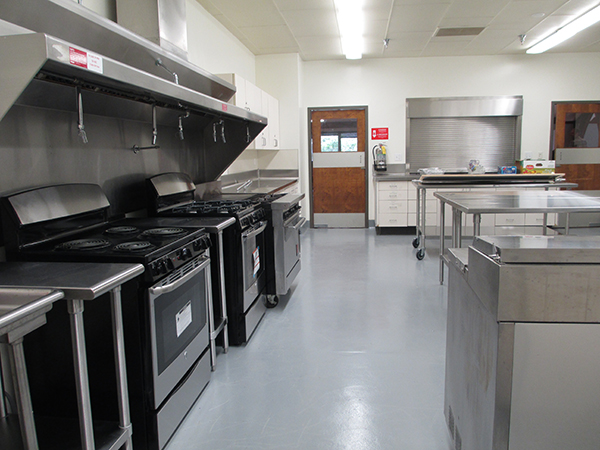This content was published: June 24, 2015. Phone numbers, email addresses, and other information may have changed.
PCC Southeast will soon savor Community Education cooking classes on campus
Photos and story by Katherine Miller

Two new stoves share quarters with a used restaurant model in the newly renovated kitchen in Southeast Administration Annex. Community Education cooking classes will begin there on July 7.
Things at PCC Southeast are hotter than ever – especially now that the campus will soon be PCC’s first to offer noncredit cooking classes on site, through its popular Community Education Program.
The program typically offers its noncredit cooking classes at licensed kitchens in churches, community centers, high schools and commercial locations. But starting summer term, Southeast Campus will hold classes in the kitchen that is being renovated in Administration Annex as part of the improvements funded by the 2008 voter-approved bond measure.
“We currently hold a variety of cooking classes all over the Portland Metro area, but the kitchens are often small community kitchens that are not set up for teaching/learning and are often difficult to schedule across multiple uses and groups,” said Rachael Precore, Home and Garden coordinator for Community Education.
“We are thrilled to have a teaching kitchen on campus and be able to serve more students with delicious opportunities to learn about cuisines from around the world.”
The annex is to the north of Administration Hall, which was originally built in 1911 as an “Altenheim,” a retirement home for German-Americans. The annex was built in various stages in the middle of the last century to provide rooms for the Altenheim’s residents. After the home was closed, the buildings became the offices of the German American Society until the property was sold to PCC in 2010.
The west wing of the annex is currently being remodeled to serve as the new child care center for the campus. The east wing will soon house the expanded campus bike program and facilities management offices. These improvements are scheduled to be completed by fall 2015.
The annex also has what is called “Community Hall,” a large assembly room that is available for rent and has become a vital and useful addition to the college, campus and community.
The 1,000-square-foot kitchen adjoins this hall and has been renovated to include features designed to enhance cooking instruction, including: three stoves (two gas, one electric); a large refrigerator and separate freezer; warming oven; two sinks; dishwasher; ice machine; and stainless steel preparation tables. A large mirror will soon be hung above the prep area to allow for better visibility.
Workers are busy installing the equipment and stocking items such as cutlery and cookware before the first class in July. Much of the equipment – such as the refrigerator and freezer – is both restaurant-grade and used, said Precore.
“Most importantly, there is a lot of counter space and room for students to sit, eat and work on,” she said.
The summer lineup of classes at Southeast Campus is: “All About Chiles,” “Summer in the Mediterranean,” “Wacky Fruits and Vegetables,” and “Tasty Tamales.” Most classes are $29, plus fees for supplies and ingredients.
Community Education offers hundreds of noncredit and continuing education classes in many neighborhoods as well as online. Although the program sometimes recruits part-time instructors for popular topics, community members are invited to propose a class they would like to teach. Professional certification is not required – just experience with and passion for a subject, and an ability to share it with others.
For information about the Community Education Program, call 971-722-6266.
PCC’S 2008 voter-approved $374 million bond program is increasing opportunities for residents to access quality, affordable higher education close to where they live and work. Additional classrooms, updated equipment and technology, and advanced workforce training programs are helping to pave the way for future employment options. For more information, visit the bond website.
